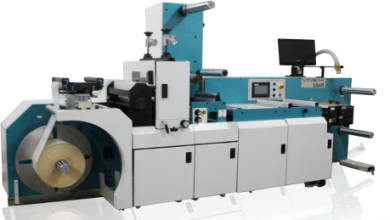IPEX 2014; A Drama In Three Acts
 Act One – A Self Fulfilling Prophecy
Act One – A Self Fulfilling Prophecy
Eskandar Jahanbani, ME Printer Editor
The news of Canon pulling out of Ipex is a further blow to the second biggest printing exhibition in the world. The fact that David Preskett, European Professional Print Director at Canon Europe was the president of Ipex makes the withdrawal even more difficult to fathom.
Is there anyone left? Heidelberg, HP, Xerox, KBA, Komori, Kodak, Agfa, Roland DG and Landa have already cancelled their participation in Ipex. Printers Superstore, a major offset press supplier in UK is not happy with Ipex’s new direction and has also threatened to quit Ipex. Apparently the company is furious about the content of the white paper in which Ipex announced its decision to refocus on digital printing technologies rather than offset.
Based on the findings of this white paper, Ipex suggests the medium-term future for graphic communications in developed markets will be digital and digital has the potential to grow rapidly in emerging markets over the coming years. Ipex intends to place a clear emphasis on digital and cross media technologies. If this is the case how bizarre does that make the digital manufacturers decision?
Despite the absence of the major offset and digital technology providers, Informa, organizer of the event is still committed to Ipex. In a recent statement following the announcement by Canon, Peter Hall, Managing Director of Informa Exhibitions said: “Ipex has been an integral part of the international printing industry for over 100 years, and therefore we do not wish to compromise the brand’s credibility. We will collaborate with all stakeholders to determine the role Ipex has to play to provide today’s printer and their customers with the ideas, insights and solutions to effectively promote the power of print media and its integration in the marketing mix. Further to these consultations, we will issue a statement about the future direction of Ipex shortly. The Informa Group remains committed to delivering world class events with the support of key industry stakeholders and we will announce our plans in due course.”
Regardless of what decision Informa will take, one thing is clear. The demise of Ipex I believe has more to do with Negative Hype than facts and figures. I refuse to accept that the industry as big and as dynamic and innovative as ours cannot afford to have two major exhibitions spaced biennially for the entire western world. The major companies pulling out now are intentionally or perhaps putting it more kindly, inadvertently following a trend set by Heidelberg and HP. The rumors regarding a dismal Ipex 2014 I remember, were already surfacing during Drupa 2012. Since the visitor turnout at Drupa 2012 was down everybody assumed Ipex was doomed regardless of the course the world economy or the industry is taking. Ipex 2014 was virtually doomed at outset by innuendo and tittle-tattle. Numbers undoubtedly are important but they should be the consequences of actions rather than some prophetic foretelling. Among the reasons that exhibiters are citing to justify their withdrawal from Ipex is change of venue, which imposes additional cost to companies.
For me as an international visitor the move to London is a blessing. Ipex has always been an International event. It’s not designed nor destined to be a Northprint style exhibition targeted for printers from the UK to attend. The organizers had to consider the priorities of International visitors and contingencies and I believe printers and industry players in UK have the moral obligation to support Ipex. The Olympics showed what a draw ExCeL can be and there was no problem with parking or transport then. Exhibitions are not only about promoting the goods and prospecting for clients it’s about feelings and emotions too. A smile, some details and a friendly conversation go a long way and work one hundred times better than a press release or a promotional video.
There is no doubt our beloved industry is experiencing a historical shift. There is a modest drop in demand for commercial printing and runs are getting shorter and everybody craves an iPad. Yet printing is still an important and part of our daily lives. If ROI is more important to those of us who play a part in the history and legacy of ink on paper and its resultant impact on human lives are not willing to invest in a world class trade exhibition, then we are all doomed.
 Act Two – A Siren Call
Act Two – A Siren Call
Rod Hayes, ME Printer Technical Editor
It is unlikely for you to be reading this unless you are involved or affected by what happens within the printing and graphic arts sector. Hold tight and persevere for the next few minutes – what I am going to say is very likely to have an impact on not only how you see your business but also how it is run. Yes Ipex – you may think you have more important things to be concerned about than whether Ipex 2014 will go ahead and if does, what form it will take. Yet the issues being played out affecting Ipex have been evolving for some five or six years and are manifestations of the changes taking place on how print is produced and used. Ipex could be a siren call, to be ignored at your peril, a warning of frightening dangers ahead.
Over dramatic? Maybe, but let’s flush out some of the issues prompting the massive withdrawal of support for Ipex. The venue is a non issue: who is trying to kid who that a visitor from outside Britain wouldn’t prefer to be in London rather than the outskirts of Birmingham regardless of its pastoral idyll. ExCel under the shadow of the Olympic stadium was the only venue to host Olympic events every day and was judged by many as the most popular venue. Yes, smaller than the NEC, but the space required by Ipex does not fill half of the NEC and hasn’t done so for many years.
No the real reason is cash; not the difficulty of calculating the cost of taking exhibition space weighted against the benefits of further business, but the raw bones behind the decision is this; many of our industry’s leading players both in digital and traditional are close to being a busted flush. The amount of print being produced is not declining, if anything it is, on a worldwide basis, growing thanks to an ever larger percentage of the world’s population being able to read and write, with English, not Chinese, the dominant form of communication.
It is absurd to suggest in the shorter term (say 10 years) that digital will be the dominant force; reality needs to strike home. The capital cost of digital presses is staggering; the Hewlett Packard T230 series colour inkjet press, or the various B2 inkjet machines demand costly inks, high energy requirements, and regular maintenance programs, making their appeal quite narrowly specific. Offset on a per sheet or square meter basis wins hands down. Yet therein lies the conundrum, which manufacturers like Heidelberg face; for years Heidelberg has been market leader in a non fragmented market, how things have changed, digital, flexo and the distribute and print sector methods of printing have clawed away at its leadership. In reality it is a basket case, while on the digital front the newness of the technology means much of the future of the Japanese and American providers is either mortgaged or in hock.
The soft option chosen is to give Informa a kicking while walking away from London 2014, but the foolishness of not facing the public at ExCeL spreads uncertainty, it sends a signal to bankers and insurance companies that underwrite monthly billings or machinery support that the printing industry is a poor risk with little long term future. As a result the cost of borrowing for new investment will be certain to rise, the cover and business support offered by financial risk organisations will become more expensive if available at all. For those not aware, the City of London and Canary Wharf, the homes for Britain’s banking and insurance industries are only a couple of stops down the line from ExCeL.
Western style technology, the way of life and doing business is inspirational both in its breadth of scope and productivity, surely what better place to show this off than London, probably the world’s leading city for doing business. Many of the exhibitors who have withdrawn from Ipex may well rue the decision; made purely on financial grounds, by bean counters who know little about the touchy, feely and hands on nature of printing.
 Act Three – So Why Return To London?
Act Three – So Why Return To London?
By Des King
Absence makes the heart grow fonder; just how much so will be abundantly in evidence when the UK’s flagship digital, media and communications event is joyfully reunited with the nation’s capital city next March after a forty year long separation.
Neither party, however, should be surprised by the dramatic changes they’ve each undergone through the passage of time. In keeping pace with the technological advances that have revolutionised the graphic arts industry the Ipex that opens its doors at the custom-built ExCeL International Exhibition & Convention centre in Docklands will bear little resemblance to the comparatively unwieldy event that spread across two unconnected venues on the other side of town back in 1971.
The transformation of London in the interim has been every bit as dynamic; not least the resurgence of the docklands area itself. It would hardly have occurred to anyone from outside of London visiting Ipex ’71 to have ventured any further east than say Tower Bridge; indeed, the idea of entering into any form of business transaction in the East End beyond maybe the purchase of a bag of jellied eels would have been pretty much inconceivable. Progressive redevelopment of the region, however, culminating in the addition not only of ExCeL itself but also new rail, road and air transport links and the incursion of both the financial services and media sectors, has transformed it into the City’s commercial heartland.
And then the icing on the top: the enduring legacy of the £9bn investment in London 2012; last year’s Olympic and Paralympic Games. There’s a 7 – 1 probability that you were amongst the 1bn of the world’s population who watched the opening ceremony on TV last year. Or maybe yours’ was one of over 5m households worldwide that tuned in to watch the Queen’s diamond jubilee celebrations. Both took place in London, of course, but in addition to actual location had something less concrete but equally as tangible in common. Whether it was spotlighting the thrill and excitement engendered by a world-class sporting competition or celebrating the pomp and circumstance of a great state occasion, these two contrasting high-profile events were defined not just by what they were but by the way in which they were staged.
An innate sense of style; a natural flair for showmanship; and the instinctive knack for being able to temper solemnity with some gentle self-parody (for example, the Queen’s spoof encounter with James Bond on the eve of the Olympics, not to mention that subsequent leap from a speeding helicopter): nobody does it quite like or better than the British, and nowhere more so than in London itself.
Operating at a whole new level on the strength of the convincing way in which it rose to the diverse challenges placed upon its transport, logistics, accommodation and entertainment services sectors during 2012, London is supremely geared to facilitate the smooth transition to ExCeL from Birmingham’s NEC; its base for the past eight shows. Meanwhile, the exhibition centre itself is sited at the heart of a perfectly integrated infrastructure tailored to meet the requirements of the international business community, which now accounts for almost 20% of all incoming tourism and is growing at around 3.5% year on year.
Whilst it’s still every bit as much the home of heritage landmarks such as Westminster Abbey and ‘Big Ben’, the London of the 21st century is now ranked as the world’s 7th most preferred city in which to stage meetings and events (source: ICCA – International Congress & Convention Association). Indeed, business visitors drawn from outside of the UK now contribute 27% of London’s overseas tourism economy; just short of £3bn per annum.
Underpinning the ease with which temporary business is being done is a more permanent solid core, with three-quarters of the world’s top 500 corporations maintaining a London-based office. Sharing a specific affinity with the broadening media and cross-channel interests represented within the evolving Ipex community itself is London’s fast-developing ‘Tech City’ digital hub: populated by a dynamic mix of blue-chip IT and social networking players such as Microsoft, Cisco, Facebook, Google and entrepreneurial start-ups, and the recipient of a UK Government £50m development grant. Indeed, there are over 23,000 IT companies based throughout London; more than in any other European city.
 Equally in tune with the Ipex community is London’s highly developed creative media communications sector spearheaded by some of the worlds’ most innovative and well-regarded ad agencies incl. Saatchi & Saatchi, Euro RSCG, Ogilvy and Leo Burnett. Directly employing over 400,000 designers, programmers, copywriters and the like, the city’s creative industries collectively generate annual revenues of almost £20bn. They’re already playing a key role in shaping Ipex’s onward evolution, says show director Trevor Crawford.
Equally in tune with the Ipex community is London’s highly developed creative media communications sector spearheaded by some of the worlds’ most innovative and well-regarded ad agencies incl. Saatchi & Saatchi, Euro RSCG, Ogilvy and Leo Burnett. Directly employing over 400,000 designers, programmers, copywriters and the like, the city’s creative industries collectively generate annual revenues of almost £20bn. They’re already playing a key role in shaping Ipex’s onward evolution, says show director Trevor Crawford.
‘In our predominantly digital world within which the time-lapse between intention and execution can be measured by the click of a button, print is continuously adapting to compete against an ever-expanding menu of other communications technologies; the net result being that its deployment is far more in the hands of the marketing department than the engineer. Ease of accessibility to this broader range of options is a key factor that has determined the extension of the long-established Ipex format via the strategic inclusion of the Cross Media focus on multi-channel messaging media.
‘Aside from all its many other attributes, staging the event in this part of London aligns it at the core of the prevailing zeitgeist. Location, location, location doesn’t have any more dynamic resonance than right here, right now.’
With over 40% of the city’s working population not British-born and over 300 different languages habitually spoken on a daily basis, London provides a unique office from office environment making it: ‘the best European if not global city in which to do business,’ says London’s Mayor Boris Johnson. Arguably the city’s greatest ambassador, this current Mayor is not only the quintessential embodiment of London’s new can do / will do persona, but also in wearing his non-mayoral hat is a regularly published print and broadcast media journalist who is naturally taking a special pleasure in welcoming Ipex visitors and exhibitors back to the nation’s capital city next year. His branding it as ‘the Olympics of the global Printing Industry’ is a badge of honour that Team Ipex wears with considerable pride.
Epilogue – Open Letter From IPEX Organiser
In an open letter signed by Ipex 2014 Event Director Trevor Crowford and Informa Exhibitions Managing Director Peter Hall, the future of Ipex and the position of the show’s organiser is clarified
Trevor Crowford, Director of Ipex 2014
We are writing to you to clearly set out our position regarding Ipex 2014 and our plans for the future. We all understand that print is experiencing some change – economic, technological, social, and environmental. Events that represent print – such as Ipex – have to adapt and reflect those shifts.
When an event takes place every four years, that degree of change can appear dramatic. In fact, it’s simply that a cyclical event like this pulls together the incremental changes that happened over that time period and concentrates them into one experience.
Industries that are in flux have to re-evaluate themselves. They need to be brave and find the clarity to focus on what is valuable and should be developed. This is exactly what our customers and their customers are doing. The same goes for us as an event brand.
Ipex will take place in London in 2014. We stand firmly by our mission: to provide today’s printer and their customers with the ideas, insights and solutions to effectively promote the power of print and its integration in the marketing mix.
As always, we’re putting commercial printers right at the heart of Ipex. We surveyed more than 1600 printers worldwide to ask them how Ipex could continue to be relevant to their needs.
They told us:
– We’re channelling major capital investment into digital and post press, to complement what we have already.
– We’re keen to embrace opportunities in new applications, especially packaging.
– We want to understand more about how print works in multichannel marketing.
– We need our customers to understand more about what print can do for them.
We’ve taken that research on board to shape our planning. We’re committed to delivering an event that will help printers from all over the world to adapt to these changes and build for the future. Ipex will be the only event in 2014 that brings together the whole international print supply chain to learn, network and do business.
We said we’d focus the show on digital: some have interpreted that to mean Ipex will no longer serve litho printers. Nothing could be further from the truth. We expect 80% of our visitors to be commercial printers, whether they print litho, digital, or with a mix of complementary processes. Most successful printers don’t define themselves by the type of press they operate.
Printers are looking to Ipex for vital leadership and guidance. They need a neutral environment, not controlled by a single manufacturer, where they can find the time and space to assess and absorb the changes and opportunities around them. We will provide them with a wealth of world-class content through initiatives such as the World Print Summit.
Ipex is a year away. We’re working to deliver an event that gives printers what they need, while also attracting the people who buy print, and showing them what print is capable of, working hand in hand with other communications channels.
Ipex has print at its heart. If you do too, then you’ll be at Ipex 2014.







